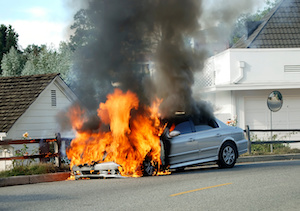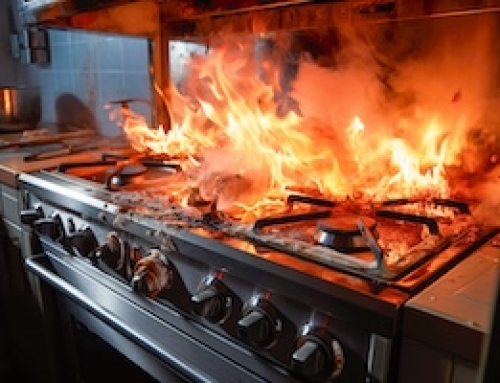 Witnessing a car fire is alarming, but just imagine if it is your car that becomes engulfed in flames. While it is alarming, it can and does happen and you need to know what to do if your car catches on fire. According to the National Fire Protection Association, there are approximately 200,000 car fires in the U.S. each year. Being prepared for the unexpected provides the best opportunity to protect yourself and others should the unthinkable happen.
Witnessing a car fire is alarming, but just imagine if it is your car that becomes engulfed in flames. While it is alarming, it can and does happen and you need to know what to do if your car catches on fire. According to the National Fire Protection Association, there are approximately 200,000 car fires in the U.S. each year. Being prepared for the unexpected provides the best opportunity to protect yourself and others should the unthinkable happen.
Reasons a Car May Catch on Fire
You may not think car fires are that common or that it won’t happen to your auto, but below are some common causes of vehicle fires.
- Poor maintenance- If you have an older car, you need to make sure you have routine maintenance to ensure you don’t have oil leaks, mechanical or electrical failure. Older autos account for three-quarters of highway car fires caused by electrical or mechanical failures.
- Auto Accidents- The NFPA (National Fire Protection Association) shows that auto accidents account for 5 percent of car fires; however, those auto fires account for 63 percent of car fire deaths. When an auto accident happens, the car can leak fluids that ultimately can catch on fire, trapping those occupants inside and making it hard to evacuate the car.
- Mechanical issues- The NFPA states that malfunction and mechanical issues are the leading source of vehicle fires.
Do’s and Don’ts to Protect Your Vehicle, but Not Limited to:
If your catches on fire, you need to act quickly as the fire can engulf your car in seconds. If you do suspect or see that your car is on fire, do the following.
- Immediately pull over.
- Turn off the engine. Doing this will cut the electrical power off from certain mechanisms and stop the flow of gas to the engine.
- Immediately evacuate the car. Staying safe is essential. Make sure everyone immediately gets out of the car and maintains a distance of at least 100 feet from the car.
- Call 911. Doing this right away is essential to ensure the fire truck/workers get there as quickly as possible.
- Don’t attempt to put out the fire. It is recommended you maintain a safe distance and let the professionals handle the fire.
- Never open the hood or trunk of the car. That can create a sudden increase to the airflow which will create a bigger problem. Keep in mind that many of your car’s components can explode during a fire, imploding dangerous debris in your direction.
Ways to Minimize the Likelihood of a Car Fire
There are ways you can protect yourself from a car fire or at least minimize the likelihood it will happen by following some basic tips.
Watch where you park. Avoid parking in areas where there are flammable items that can meet your exhaust. Your exhaust system can reach exorbitant temperatures which if contact is made, can catch fire.
Upkeep your auto. Make sure you have your car routinely serviced by a trained, licensed auto mechanic to ensure it is running safely. The key is to detect small issues that can be addressed before it becomes a bigger problem.
Use caution when transporting fuel. When transporting fuel in your car, make sure it’s done safely to avoid spillage. Gas should be stored in a sealed container and never placed in the passenger side of the car.
A fire can cause significant damages to your car in a short period of time. Statistically, about two-thirds of all vehicle fires originate in the engine compartment. Ultimately this can result in damages to your electronic systems, transmission, and engine, not to mention your paint and exterior systems. Be prepared! Most cars that catch on fire are rendered a total loss.
If you have any questions or concerns about vehicle fires, contact our offices at Burkett & Associates and we will assist you with coverage issues, exclusions, limitations, and deductibles. Don’t wait! Call us today at 256-704-7400.






